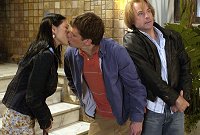 As Close as it Gets
As Close as it Gets You spent some time attached to each other before filming.
You spent some time attached to each other before filming.Kinnear: Yeah we did. We spent some time at Carrie Fisherís house playing tennis, cooking burgers.
Damon: Yeah, playing tennis was fun.
Why Carrie Fisherís house?
Damon: The Farrellys know Carrie Fisher and she had a tennis court. Thatís how it works with these guys: ĎGo over to Carrie Fisherís tennis court, sheíll be waiting for you, donít worry about it.í
Kinnear: Thatís how it is and usually they call you 15 minutes before they want you to do something.
Did you know each other before this film?
Damon: Actually we had signed up for the movie before we even met each other.
Kinnear: It was a dangerous exercise. It could have gone horribly wrong. Oh, letís not kid ourselves, it did go horribly wrong!
Especially since you look so different!
Damon: You know, they originally wanted Jim Carey and Woody Allen, and that would have meant they needed an explanation as to why they looked so different. So they came up with the idea that one has more liver and the other was aging a lot worse. That was it really.
Kinnear: Their movies have an element of the outrageous but there is an element of reality to them.
How did you prepare for being joined together like that? Did you train?
Damon: When you say Ďtrainí it suggests something methodical. But there was no science in this. They tied us together and they just pushed us so it was just time spent walking around together and getting used to it. Once we started shooting we were together 12 hours a day. At first, before we would even sit down, we would go ĎOne, two, three: sit!í But a week into it we could stand, we could walk, we would sense what the other was doing.
Kinnear: And we werenít sure who was moving who. It was like on a Ouija board. Everyone puts their hands on and sure enough this stupid thing starts to move. Somebodyís pushing it. There are no spirits, OK! Actually, we did some work with a trainer for the tennis.
Damon: And the baseball and hockey. The cooking ó we kind of made up that routine.
What happens in the bathroom?
Damon: Well, truthfully the bathroom scenario for guys, I mean we do it all the time. I mean at least half of the bathroom scenario we do anyway.
Kinnear: Yeah and letís take the other half of it out of the scenario right away, thatís not in the equation.
Was anything in the script so over-the-top that didnít make it into the final cut?
Damon: No, the farthest we went is in there. I mean, playing goalie in the hockey team is in there, we had a sex scene, you know, albeit tastefully shot. Itís all in there.
Kinnear: The script is pretty representative of the movie. Obviously itís a tricky subject matter, but they have dealt with this kind of material before and theyíve kind of gone to the line and straddled it a bit and I felt that was what was happening here. And really, if you know these guys, and Iíve known them for a lot of years, I knew that they would deal with this right and it would be coming from a good place. They have a lot of people with disabilities work on their movies. And they handle this OK.
Do you expect a lot of criticism for this film?
Damon: I would not, but you never know. I remember doing Dogma with Kevin Smith, and there were protest rallies and at that point nobody had even seen the movie. And Kevin, who is a practicing Catholic, was out there going, ĎI donít understand. How can you protest about a movie you havenít even seen?í Not that it would happen on that scale for this movie, but you know I would hope people would at least see the movie before they have something to say about it. I mean, when we first heard the pitch we were like, ĎOh.í But itís a really warm movie and you know itís got a lot of heart, as they say in the business.
Kinnear: I think the point is that they never tell a joke at the expense of someone gratuitously. If they donít think it was a character quirk or true to the story or whatever, I donít think they would ever be maliciously, intentionally mean.
Damon: They live on the edge a little with their humour but there isnít anything wrong with that.
Did you miss each other once the film was over?
Damon: Well, Gregís been stalking me since the end of the movie. I see him every night standing outside of my window crying.
Kinnear: Thatís right, Iím stalking him. It was sad when the movie was over. Rocket, who is in the movie, kind of gives the final speech when the movie is done. The Farrellys put the whole speech into the end credits if you wait long enough.
Is there something about the Farrellys?
Kinnear: Bobbyís the more boisterous. They watch the take and kind of confer. They have different styles. Itís very collective; if you watch them itís hard to work out which is the alpha brother. In a lot of ways they are the story of Bob and Walt. And they are open to the idea of improvising.
Did you ask them if the film is autobiographical?
Damon: Thatís way too philosophical to mention to Peter and Bobby. You know, ĎIs this about you guys?í And it would be, ĎHuh? Iím going to get another beer. This is hurting my head.í
Kinnear: They wouldnít take to that conversation too well but I think whether they know it or not there is some underlying truth. As artists they could go solo. They could go their own way, their separate ways. And they are probably always struggling with that question: ĎShould we separate?í So I think there is some element of them in there.
Do you have people you are that close to?
Kinnear: I will never have anyone in my life that I was as close to as Matt Damon in the spring of 2002!
Damon: I would have to agree, I donít think I would ever invite someone that far into my personal space for that amount of time.
JAN.04



